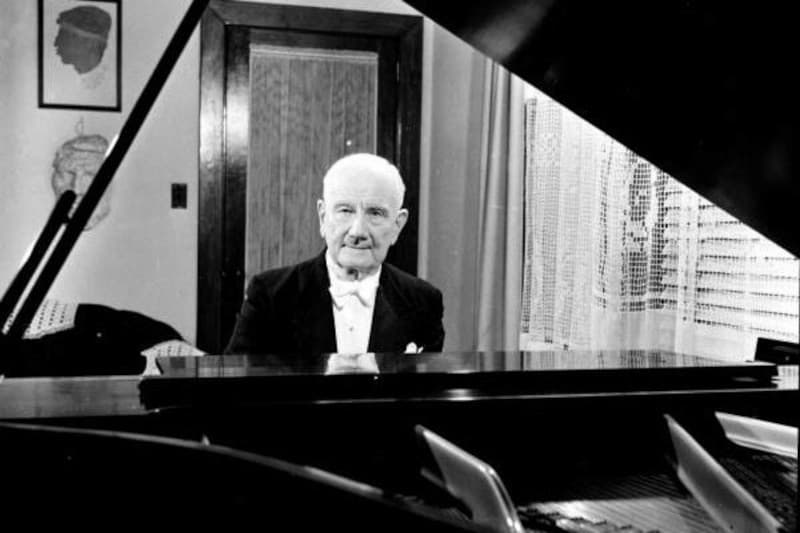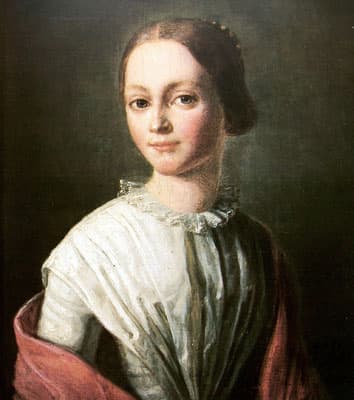The orchestra is mighty, chords resonating in a large space, the timpani emphasizing the vastness of the concept. It’s a bit Wagnerian – some ideas seem like they might do well in Die Walküre or perhaps there’s a foreshadowing of some Mahlerian ideas.
Ernő Dohnányi: Variations on a Nursery Song, Op. 25 – Introduction: Maestoso (Eldar Nebolsin, piano; Buffalo Philharmonic Orchestra; JoAnn Falletta, cond.)
And then comes the surprise of the theme for this Theme and Variations movement.
Ernő Dohnányi: Variations on a Nursery Song, Op. 25 – Theme: Allegro (Eldar Nebolsin, piano; Buffalo Philharmonic Orchestra; JoAnn Falletta, cond.)
We know that – it’s Ah, vous dirai-je, Maman, aka Twinkle, twinkle little star, which we may already know from a classical connection via Mozart’s variation set, K. 265.
Ernst von Dohnányi (1877–1960) wrote his Variations on A Nursery Song for piano and orchestra, Op. 25, in 1913/14. At the time, he was teaching at the Hochschule in Berlin (1905–1915).

Ernst von Dohnányi © thepianofiles.com
He was well aware of the striking difference between the Introduction and the following Theme, and wrote this on the manuscript: ‘For the enjoyment of those with a sense of humor; to the annoyance of everyone else’. He left this off the printed score, though.
Dohnányi liked to create, starting with simple themes and then mixing them up with a number of creative variations. In the 11 variations in this work, we have variations starting from the presentation of the theme – on the repeat, you’ll hear that he’s already making changes with the instructions that the pianist plays it thus: ‘A little blurry, with lots of pedals; like a musical clock’. The orchestra starts its entry just at the end of the movement.
The first variation is much like we would expect – lots of extra notes added.
Ernő Dohnányi: Variations on a Nursery Song, Op. 25 – Variation 1: Poco più mosso (Eldar Nebolsin, piano; Buffalo Philharmonic Orchestra; JoAnn Falletta, cond.)
By the time we get to the sixth variation, we’re in pure virtuosic mode, and then the seventh takes us into a waltz.
Ernő Dohnányi: Variations on a Nursery Song, Op. 25 – Variation 7: Walzer: Tempo giusto (Eldar Nebolsin, piano; Buffalo Philharmonic Orchestra; JoAnn Falletta, cond.)
Then, following the waltz, we go into a march tempo with the mood set by a definitely non-marching instrument: the bassoon.
Ernő Dohnányi: Variations on a Nursery Song, Op. 25 – Variation 8: Alla marcia: Allegro moderato (Eldar Nebolsin, piano; Buffalo Philharmonic Orchestra; JoAnn Falletta, cond.)
The 9th variation, again, with the bassoons, sounds much like the climaxes and declines we’re familiar with in Dukas’ The Sorcerer’s Apprentice, written just a few years before in 1897. The use of percussion underlines that sound, as well.
Ernő Dohnányi: Variations on a Nursery Song, Op. 25 – Variation 9: Presto (Andante rubato) (Eldar Nebolsin, piano; Buffalo Philharmonic Orchestra; JoAnn Falletta, cond.)
The 10th variation is one of the highlights of the work, majestic and stately, with more than a few reminders of another new work, Rachmaninoff’s Second Piano Concerto. We know Dohnányi was familiar with the work because he was an accomplished pianist.
Ernő Dohnányi: Variations on a Nursery Song, Op. 25 – Variation 10: Passacaglia: Adagio non troppo (Eldar Nebolsin, piano; Buffalo Philharmonic Orchestra; JoAnn Falletta, cond.)
We’ve wandered quite a long way away from our opening nursery rhyme, and it’s in the finale that our little song comes back again.
Ernő Dohnányi: Variations on a Nursery Song, Op. 25 – Finale fugato: Allegro vivace (Eldar Nebolsin, piano; Buffalo Philharmonic Orchestra; JoAnn Falletta, cond.)
The work was given its premiere in Berlin in February 1914 with the composer at the piano. He was fond of the work and took it on tour after its premiere, playing the work along with his first piano concerto.
For more of the best in classical music, sign up for our E-Newsletter




Listening to this now in Euro. youth orch/ World Orch. Week (WQXR) and wondering : was he joking? Thank you; now I know – he was! The piece contains multitudes.